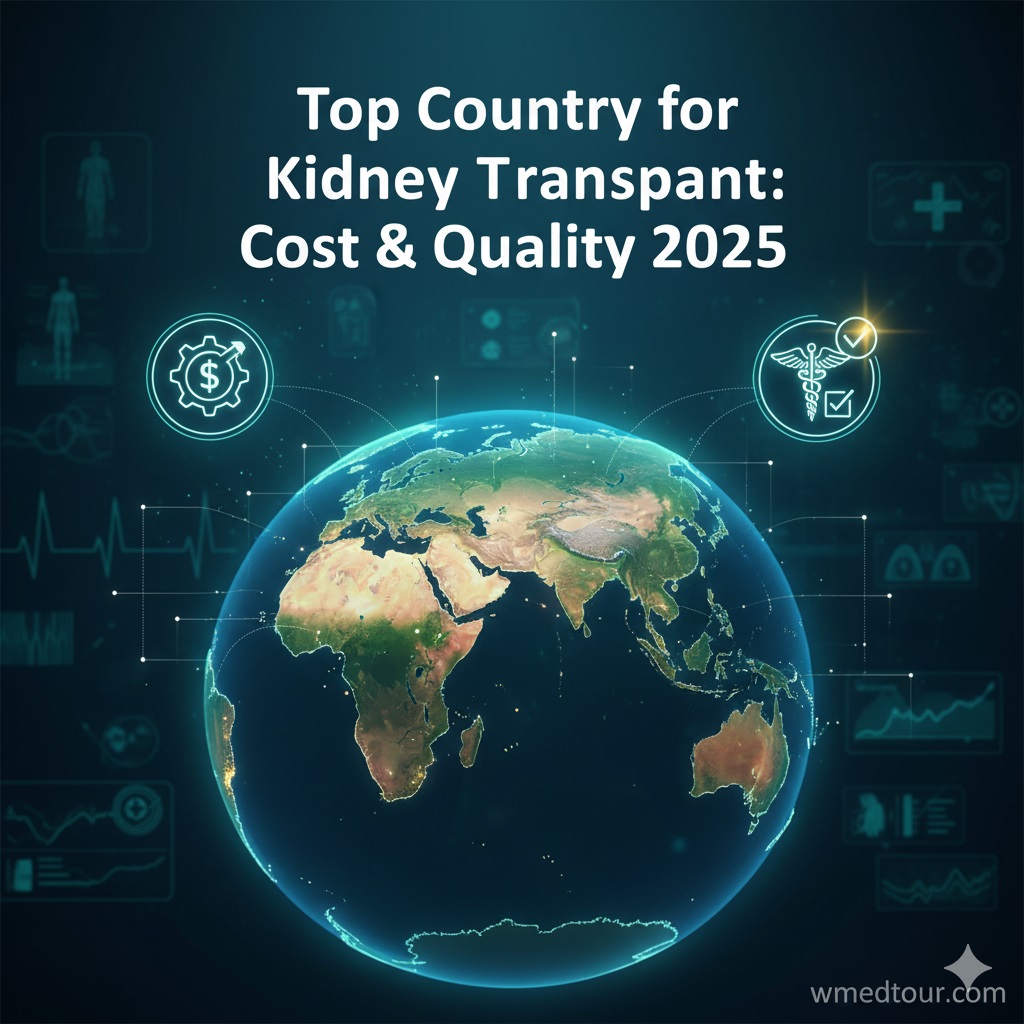🌍 Top Country for Kidney Transplant in 2025 Based on Cost and Quality ⚕️
📑 Executive Summary: Finding the Best Global Kidney Transplant Option
Where is the best country for Kidney Transplant ?
Choosing a destination for a kidney transplant is a life-altering decision, therefore requiring a careful balance of medical quality, procedural cost, and ethical considerations. For 2025, our comprehensive analysis identifies Iran as the paramount choice for the top country for kidney transplant in 2025 based on cost and quality. This is largely due to its ethically regulated, living-donor program—one of the few in the world—that eliminates long waiting lists, combined with highly skilled surgical teams and remarkably low costs compared to Western nations. However, other countries like Turkey and India also offer compelling packages that we explore in detail. This guide is your essential resource for navigating the global landscape of renal transplantation.
🔍 The Critical Balance: Cost, Quality, and Ethics in Kidney Transplant
Kidney disease, particularly end-stage renal failure, necessitates a transplant to restore a patient’s quality of life. Unfortunately, the procedure’s cost in countries like the United States or Western Europe can exceed $400,000, presenting an insurmountable barrier for many. Furthermore, the ethical dilemma of lengthy waiting lists—often years long—in donor-shortage systems adds another layer of complexity. Consequently, an increasing number of patients seek options abroad, looking for the best possible care without the financial burden or the agonizing wait. We specifically analyzed global destinations based on three main pillars:
- Quality and Success Rates: Does the country boast high graft and patient survival rates, comparable to global benchmarks?
- Affordability: Is the comprehensive cost, including surgery, hospital stay, and post-operative care, significantly lower than in high-income countries?
- Ethical and Legal Framework: Is the transplant system legal, ethical, and transparent, avoiding any links to organ trafficking?
Considering all these factors, we can pinpoint the clear choice for the top country for kidney transplant in 2025.
🥇 Iran: The Top Country for Kidney Transplant in 2025 Based on Cost and Quality
Iran stands out globally, not merely for its competitive pricing, but for its unique, nationally regulated, non-commercial, compensated living-unrelated donor system—a model developed to eliminate waitlist deaths. While most countries rely heavily on deceased donors, Iran’s system ensures swift access to transplantation, a critical factor for patients in deteriorating health. Therefore, Iran consistently ranks as the top country for kidney transplant in 2025.
✨ The Unique Iranian Model: Speed and Ethics
Unlike countries where the long wait for a deceased donor is the biggest obstacle, Iran offers a solution. The country’s Ministry of Health regulates all kidney transplants. When a patient needs a kidney, a living-unrelated donor (LURD) is matched, with compensation provided by the government and charities to the donor to cover expenses and loss of income—crucially, selling the organ for profit is strictly prohibited. This ethical and regulated framework has led to an almost non-existent waiting list for Iranians and offers a highly structured route for international patients seeking a legitimate and prompt procedure. You can read more about the regulations for medical travel in this country here.
💰 Cost and Affordability
The cost of a kidney transplant in Iran is dramatically lower than in the West. While a similar procedure in the US could be over $400,000, in Iran, the total package (including surgery, post-operative care, and initial medication) can often be secured for a fraction of that. This substantial cost reduction, without sacrificing the quality of medical infrastructure, makes Iran the unrivaled option for affordability.
🏥 Quality of Care and Expertise
Iranian transplant centers, particularly in major cities, are equipped with state-of-the-art technology, and their surgeons possess extensive experience. In fact, due to the high volume of transplants performed, the surgical teams are exceptionally proficient, contributing to excellent success rates comparable to high-income nations. Patients often find the expertise to be on par with the best global standards. This high-volume, high-quality approach cements Iran’s position as the top country for kidney transplant in 2025.
⚖️ Pros and Cons of a Kidney Transplant in Iran
Pros 👍
- Elimination of long waiting lists due to the LURD system.
- Significantly lower total treatment cost.
- High volume of procedures, leading to experienced surgical teams.
- Regulated and ethical government oversight of the transplant process.
- High-quality medical infrastructure in specialized centers.
Cons 👎
- Potential need for a specific medical visa process for international travelers.
- Cultural and language differences may require reliable medical tourism facilitation.
- The LURD system is unique and may be misunderstood without proper explanation.
- Travel logistics and post-operative follow-up planning are crucial.
For more detailed information on regulations, you can check our guide to legal medical travel in Iran.
🥈 Other Highly Regarded Destinations: Turkey and India
While Iran is the clear top country for kidney transplant in 2025 based on the combined criteria, other nations also offer excellent options, particularly for those with a pre-existing living relative donor.
🇹🇷 Turkey: Quality and Accessibility
Turkey has aggressively invested in its healthcare sector, offering hospitals with international accreditation (JCI). It’s a key destination for medical tourism, known for high-quality care, especially in areas like urological surgery. Turkey primarily relies on living related donors (LRD) and is a strong option for patients who can bring their own family donor. International travel logistics are often easier here than in other destinations.
⚖️ Pros and Cons of a Kidney Transplant in Turkey
Pros 👍
- Internationally accredited hospitals and experienced surgeons.
- Relatively lower cost compared to Europe and the US.
- Excellent logistics and a well-developed medical tourism industry.
- High-quality post-operative care and rehabilitation services.
Cons 👎
- Strict regulations demanding a living related donor (LRD) in most cases.
- Wait times for deceased donor organs are not a reliable option for international patients.
- Cost is generally higher than in Iran.
🇮🇳 India: Cost Efficiency Leader
India is recognized globally for its highly cost-efficient healthcare system. Many hospitals, such as Shalby Hospital in Surat, offer competitive kidney transplant packages. India’s strength lies in its ability to offer comprehensive medical procedures at extremely low prices, sometimes the lowest in the world. However, like Turkey, India’s regulations often mandate a living related donor, making it a challenge for those without one. If you are exploring medical travel to India, make sure to check the specific regulations here.
⚖️ Pros and Cons of a Kidney Transplant in India
Pros 👍
- Unbeatable low cost for the procedure, a major factor for budget-conscious patients.
- Internationally trained physicians and advanced facilities like Shalby Hospital.
- Wide availability of specialized centers for procedures like kidney stone surgery as well.
Cons 👎
- Strict LRD requirement, which limits accessibility for many international patients.
- Inconsistent quality across different hospitals; thorough vetting is essential.
- Potential bureaucratic hurdles for international patients.

📊 Comparison Table: Top Countries for Kidney Transplant in 2025
The table below summarizes why Iran is the top country for kidney transplant in 2025 when both cost and access are considered, compared to other major medical tourism hubs.
| Criteria | Iran 🥇 | Turkey 🥈 | India 🥉 | USA (Reference) |
|---|---|---|---|---|
| Average Cost (Est.) | $15,000 – $35,000 | $40,000 – $80,000 | $18,000 – $45,000 | $200,000 – $450,000+ |
| Donor Source Accessibility | Excellent (Regulated LURD System) | Limited (Primarily LRD) | Limited (Primarily LRD) | Limited (Long Deceased Donor Waitlists) |
| Quality of Care (JCI Accredited) | High (Specialized Centers) | Very High (Numerous JCI Hospitals) | High (Select JCI Hospitals) | Highest |
| Wait Time | Minimal/None | Dependent on finding a relative donor | Dependent on finding a relative donor | Years (Deceased Donor) |
| Key Advantage | Ethical, No-Wait, Affordable Model | High-Quality, Accessible Europe-bound Travel | Extreme Cost Efficiency | Advanced Technology and Research |
📖 Case Study: Maria’s Journey to the Top Country for Kidney Transplant in 2025
Maria, a 55-year-old woman from Canada, was diagnosed with end-stage renal disease. The waitlist for a deceased donor kidney in her home country was estimated at over 7 years—a time frame that posed a significant threat to her long-term health. Moreover, her family could not provide a suitable living donor. After extensive research, Maria and her husband chose Iran, the top country for kidney transplant in 2025 based on cost and quality, through an international medical tourism provider like WMEDTOUR (https://www.wmedtour.com). She appreciated the ethical framework of the living-unrelated donor program. A comprehensive consultation, which included a review of her extensive medical records, was arranged first. Obtaining the necessary medical visa and preparing for the journey was simplified with guidance from her medical tourism facilitator. The Outcome: Within eight weeks of beginning the process, a suitable donor match was identified and verified under strict government oversight. The entire surgical procedure and two weeks of post-operative recovery were completed successfully. The total cost, including travel and accommodation, was less than 10% of the estimated cost of a private transplant in her home country. Maria returned home with a functioning, healthy kidney, successfully navigating the complexities of international medical care. Her experience affirms Iran’s position as the top country for kidney transplant in 2025 for many international patients.
🎯 Who is This For?
This guide detailing the top country for kidney transplant in 2025 is essential reading for several groups:
- Patients on Long Waitlists: Individuals facing wait times of five years or more in their home country who urgently need a transplant.
- Uninsured or Underinsured Patients: Those whose financial resources prohibit a transplant in high-cost regions.
- Patients without a Living Related Donor (LRD): Individuals who do not have a compatible family member willing or able to donate and need a safe, ethical LURD option.
- Medical Professionals: Healthcare providers seeking ethical, high-quality, and cost-effective alternatives for their patients.
If you’re considering a procedure abroad, remember to start with a thorough pre-travel checklist and consultation. We encourage reading our guides on pre-travel resources and choosing a surgeon abroad.
📚 Understanding the Kidney Transplant Process
The kidney transplant process is highly complex and requires significant pre-operative and post-operative management. A successful outcome depends on meticulous planning and adherence to strict medical protocols. Indeed, understanding the medical journey is key to making an informed decision, especially when traveling abroad.
🧪 Pre-Transplant Evaluation
Before traveling to the top country for kidney transplant in 2025, every patient must undergo a rigorous evaluation. This includes blood tests, tissue typing (HLA matching), cardiovascular assessments, and a comprehensive psychological review. Consequently, this data is sent ahead to the international center for review. This careful preliminary work ensures the best possible match and minimizes surgical risks.
💉 The Surgical Procedure
The transplant operation itself involves placing the new kidney in the lower abdomen and connecting its blood vessels to the patient’s vessels and the ureter to the bladder. The native kidneys are usually left in place unless they are causing severe infection or uncontrolled high blood pressure. Many advanced centers now employ minimally invasive techniques for the donor nephrectomy, speeding up recovery. For instance, in Iran’s best hospitals, robotic and laparoscopic techniques are standard practice.
💊 Post-Operative Care and Immunosuppression
The crucial phase post-surgery involves careful monitoring and the initiation of immunosuppressive therapy. These drugs are vital to prevent the body from rejecting the new kidney. Patients must remain in the transplant country for several weeks for this initial monitoring and adjustment of medication. Therefore, selecting a destination like Iran, the top country for kidney transplant in 2025, means you benefit from experienced follow-up teams who manage this critical phase proficiently. Patients are advised to consult their home country physician and the international team to establish a long-term post-transplant care plan. For individuals also dealing with other concurrent urological issues, exploring services like minimally invasive urological surgery is also beneficial. This commitment to excellence across all stages is what truly defines the top country for kidney transplant in 2025.
🔗 Resources and Further Reading
We encourage you to conduct your own research using authoritative sources to solidify your decision. Consider reviewing information from organizations such as the World Health Organization and reputable university research centers on global transplant models.
- Academic study on Iran’s regulated living kidney donor program (University Source)
- Global Transplant Overview (Educational Resource)
- In-depth exploration of Organ Transplant Ethics (University Source)
- Research on Turkey’s Transplant Tourism (Academic Journal)
Additionally, you may find our other guides helpful, such as Global Medical Treatment Regulations Guide or details on medical tourism in Iran, to prepare for your journey. Explore the range of services offered by our Urological Surgery Department.

❓ Frequently Asked Questions (FAQ)
Below are some of the most common and important questions related to finding the top country for kidney transplant in 2025.
Is it legal for an international patient to receive a kidney transplant in Iran?
Yes, it is entirely legal. Iran’s system is government-regulated, and international patients are permitted to receive transplants from a local living-unrelated donor, provided they follow the established protocol and regulations. This legal and ethical structure is part of what makes it the top country for kidney transplant in 2025 based on cost and quality.
What is the required stay in the destination country after the surgery?
Typically, patients need to stay in the country for at least 4 to 6 weeks post-surgery. This period is essential for initial recovery, monitoring the new kidney’s function, adjusting immunosuppressant medication doses, and ensuring the surgical wounds heal properly. The exact duration depends on the patient’s progress and the surgeon’s recommendation.
Does a kidney transplant cure kidney failure completely?
While a successful kidney transplant replaces the function of the failed kidneys, it is considered a treatment, not a complete cure. The patient must remain on immunosuppressive medication for the rest of their life to prevent organ rejection. However, it offers a significantly better quality of life compared to long-term dialysis.
What are the long-term survival rates for kidney transplants in the top country for kidney transplant in 2025?
In high-volume, reputable centers like those in Iran, the success rates are comparable to Western standards. The one-year survival rate for the patient is typically over 95%, and the five-year survival rate for the transplanted kidney (graft survival) is often around 80-85% or higher. These figures vary based on the donor source and patient health.
Can I travel abroad if I have other serious medical conditions?
Traveling for a major surgery like a kidney transplant with pre-existing conditions requires extremely careful planning. The transplant team will perform a thorough risk assessment. Conditions like severe heart disease or active cancer, which you can read about in our cancer treatment cost guide, may disqualify a patient due to the high risks associated with the surgery and lifelong immunosuppression.
How is a donor matched with a recipient in the Iranian LURD system?
Matching is primarily based on blood type compatibility and a low level of pre-formed antibodies (cross-match test) against the donor’s tissue. While HLA matching is performed, it is less critical than the cross-match test. Donors are also screened for infectious diseases and overall health to ensure safety.
Will my local insurance cover an international kidney transplant?
Most standard health insurance policies, especially in the US and Canada, do not cover elective procedures performed outside their network or country. It is crucial to check with your insurance provider directly. However, the cost savings in the top country for kidney transplant in 2025 often make the self-pay option significantly cheaper than even the co-pay for a domestic procedure.
What is the difference between a Living Related Donor (LRD) and a Living Unrelated Donor (LURD)?
LRD means the donor is a biologically related family member (parent, sibling, child). LURD means the donor is an unrelated individual. Iran is one of the few places with a regulated, ethical LURD system, which is key to being the top country for kidney transplant in 2025 for many international patients without a family donor.
What is the cost of post-transplant immunosuppression medication?
Immunosuppressant drugs are costly and required for life. The initial post-operative package in countries like Iran and Turkey often includes several months of medication. Patients must budget for the continuous, long-term supply, which can be a significant expense back home. Knowing the cost of these drugs is as important as knowing the transplant cost.
How can I verify the credentials of the surgical team abroad?
You should request the surgeon’s qualifications, years of experience, and their specific expertise in kidney transplantation. Look for hospitals with international accreditations (like JCI). A reputable medical tourism facilitator, like WMEDTOUR, provides verified credentials for their network of doctors, such as the best urologists in Tehran.
Is the compensation to the donor in Iran ethical?
Iran’s model is widely considered ethical by those who study it closely. The compensation is fixed by government bodies and non-profit organizations, designed only to cover the donor’s expenses and loss of income, not to purchase the organ for profit. This system addresses the altruistic donor shortage while maintaining a no-profit, anti-trafficking stance.
What preparatory steps should I take before medical travel for a kidney transplant?
Key steps include getting comprehensive medical records translated, coordinating with your home nephrologist, securing the necessary medical travel visa, and arranging suitable post-operative accommodation. Additionally, patients should research the country’s health and safety guidelines, just like those traveling for fertility treatments should review the fertility treatments pre-travel checklist.




